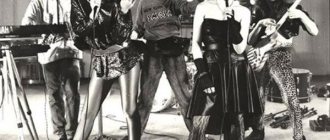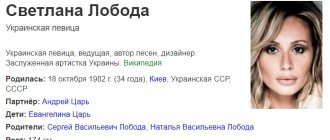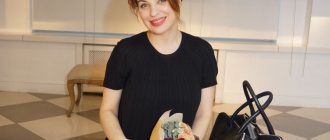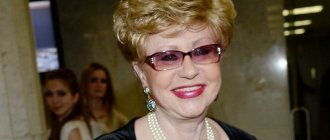Wikipedia has articles about other people with the last names Peters, Alliluyeva and Stalin.
| Svetlana Alliluyeva | |
| Svetlana Alliluyeva in 1970 | |
| Birth name | Svetlana Iosifovna Stalina (Dzhugashvili) |
| Date of Birth | February 28, 1926(1926-02-28)[1][2][3][…] |
| Place of Birth | Leningrad, RSFSR, USSR |
| Date of death | November 22, 2011(2011-11-22)[4][1][2][…](85 years) |
| A place of death | Richland Center, Wisconsin, USA |
| Citizenship | USSR USA UK |
| Occupation | memoirist, philologist, translator, candidate of philological sciences |
| Father | Joseph Vissarionovich Stalin |
| Mother | Nadezhda Sergeevna Alliluyeva |
| Spouse | 1) Grigory Iosifovich Morozov 2) Yuri Andreevich Zhdanov 3) Ivan (Jonrid) Aleksandrovich Svanidze[5][6] 4) Brajesh Singh (actual marriage) 5) William Wesley Peters |
| Children | son: Joseph Alliluyev daughters: Ekaterina Zhdanova and Olga Evans (Chris Peters) |
| Media files on Wikimedia Commons | |
Svetlana Iosifovna Allilueva
(Georgian სვეტლანა იოსების ასული ალილუევა) (nee
Stalin (Dzhugashvili)
[7][8], in exile -
Lana Peters
(eng. Lana Peters); February 28, 1926, Leningrad [
source not specified 1976 days
] - November 22, 2011, Richland, Wisconsin [9]) - Soviet translator, philologist, candidate of philological sciences; memoirist.
She is known primarily as the daughter of I.V. Stalin, about whose life she left a number of works in the genre of memoirs. In 1967, she emigrated from the USSR to the USA.
Biography
Born into the family of Joseph Stalin and Nadezhda Alliluyeva. Her mother committed suicide on November 9, 1932.
As a child, Svetlana had a greater influence on her nanny Alexandra Andreevna, who previously, in particular, worked in the family of N.N. Evreinov[6].
She graduated with honors from Model School No. 25 in Moscow, where she studied in 1932-1943. After school, she planned to enter the Literary Institute, but her father did not like her choice[6].
She entered the Faculty of Philology of Moscow State University. M.V. Lomonosov, where I studied for a year. She got sick and then returned to her first year, but this time at the Faculty of History. She chose to specialize in the Department of Modern and Contemporary History, studying Germany[7]. She graduated from the Faculty of History of Moscow State University (1949) and graduate school at the Academy of Social Sciences under the CPSU Central Committee. In 1954 she defended her Ph.D. thesis “The Development of Advanced Traditions of Russian Realism in the Soviet Novel.” Candidate of Philology. She worked as an English translator and literary editor, translating several books, including works by the English Marxist philosopher John Lewis.
In 1944, she married Grigory Morozov, a classmate of her brother Vasily. The marriage was subsequently dissolved. Son Joseph Alliluyev (1945-2008) became a cardiologist, Doctor of Medical Sciences.
In 1949 she married Yuri Zhdanov. Yuri adopted Joseph, Svetlana's first son. In 1950, their daughter Ekaterina was born[8].
After Stalin’s death, the guards discovered a savings book in his bedroom containing 900 rubles; it was handed over to Svetlana[9].
She worked at the Institute of World Literature from 1956 to 1967, in the sector for the study of Soviet literature.
In May 1962, she was baptized in Moscow and had her children baptized by Archpriest Nikolai Golubtsov[10].
Emigration
On December 20, 1966, she came to India, accompanying the ashes of her common-law husband Brajesh Singh[11]. On March 6, she asked the Soviet Ambassador Benediktov to allow her to stay in India, but he insisted that she return to Moscow on March 8, and stated that she would no longer be allowed to leave the USSR. That same day, she showed up at the US Embassy in Delhi with her passport and luggage and asked for political asylum. Permission to leave the USSR was given to her by A. N. Kosygin, a member of the Politburo of the CPSU Central Committee.
| ...my non-return in 1967 was based not on political, but on human reasons. Let me remind you here that when I was leaving for India then to take the ashes of a close Indian friend there, I did not intend to become a defector; I then hoped to return home in a month. However, in those years I paid my tribute to the blind idealization of the so-called “free world”, a world with which my generation was completely unfamiliar. S. Alliluyeva [12] |
The move to the West and the subsequent publication of “Twenty Letters to a Friend” (1967), where Alliluyeva recalled her father and Kremlin life, caused a world sensation (according to some statements, this book brought her about 2.5 million dollars [13] [14] ). She stopped in Switzerland for a while, then lived in the USA.
As Svetlana Alliluyeva’s cousin Vladimir Fedorovich Alliluyev recalled, she wrote her first book, “Twenty Letters to a Friend,” while still in the USSR. One of the copies of the manuscript was stolen and handed over to Soviet journalist Victor Louis, who secretly smuggled the book to the West and published excerpts from it in the German magazine Stern, deliberately distorting a number of facts; the book “Only One Year” was written “under the dictation of experienced ‘specialists’”
. Once in the West, Svetlana, as she herself said, immediately came under strict control[15]. She is quoted as saying: “Thanks to the CIA - they took me out, didn’t abandon me, and published my “Twenty Letters to a Friend” [16].
In 1970, she married the American architect William Peters (1912-1991), gave birth to a daughter (Olga Peters, later renamed Chris Evans), divorced in 1972, but retained the name Lana Peters. S. Alliluyeva’s financial affairs abroad were successful. The magazine version of her memoirs “Twenty Letters to a Friend” was sold to the Hamburg weekly Der Spiegel for 480 thousand marks, which translated into dollars was 122 thousand (in the USSR, according to her niece Nadezhda, Stalin left her only 30 thousand rubles). After leaving her homeland, Alliluyeva lived on money earned by writing and on donations received from citizens and organizations.
In 1982, Alliluyeva moved from the USA to the UK, to Cambridge, where she sent her daughter Olga, who was born in the USA, to a Quaker boarding school. She herself began to travel around the world.
Return to the Soviet Union
Finding herself completely alone, at the end of November 1984, unexpectedly for those around her (as S. Alliluyeva herself writes in the book “A Book for Granddaughters” at the request of her son Joseph), she appeared in Moscow with her daughter. She was greeted with enthusiasm by the Soviet authorities, and her Soviet citizenship was immediately restored. But disappointment soon set in. Alliluyeva could not find a common language with either her son or her daughter, whom she abandoned in 1967. Her relations with the Soviet government deteriorated. She went to the Georgian SSR, where she lived in a three-room apartment of an improved type, she was given a salary, special security and the right to call a car (a black Volga was constantly on duty in the garage of the Council of Ministers of the Georgian SSR to service her). In Georgia, Alliluyeva celebrated her 60th birthday, which was celebrated in the premises of the Stalin Museum in Gori. Her daughter went to school and went in for equestrian sports. Teachers at home taught Olga Russian and Georgian languages K: Wikipedia: Articles without sources (type: not specified)[ source not specified 2758 days
]. But even in Georgia, Alliluyeva had many clashes with the authorities and with former friends.
Second departure to the West
After living in the USSR for less than two years, Alliluyeva sent a letter to the CPSU Central Committee asking for permission to travel abroad. After the personal intervention of the General Secretary of the CPSU Central Committee M. S. Gorbachev in November 1986, she was allowed to return to the United States. After leaving, Alliluyeva renounced her USSR citizenship.
In the USA, Alliluyeva settled in the state of Wisconsin. In September 1992, correspondents found her in a nursing home in the UK. Then she lived for some time in the monastery of St. John in Switzerland. In December 1992, she was seen in London in the Kensington-Chelsea area. Alliluyeva drew up papers for the right to help so that, after leaving the nursing home, she could pay for the room. Her daughter Olga leads an independent life in Portland (Oregon)[17].
In 2005, she gave an interview to the Rossiya TV channel for the film “Svetlana Alliluyeva and Her Men.”
In 2008, Alliluyeva, who had refused to communicate with journalists for so long, starred in the 45-minute documentary film “Svetlana about Svetlana.” During the interview, she refused to speak Russian, citing the fact that she is not Russian (her father is Georgian, and her mother is the daughter of a German woman and a Gypsy)[18].
Recently, Svetlana Alliluyeva lived in a nursing home near the city of Madison (Wisconsin) under the name Lana Peters.
She died on November 22, 2011 in a nursing home in Richland (Wisconsin, USA) from colon cancer[19]. Alliluyeva's death was announced on November 28 in the New York Times. At the same time, a representative of the municipality told reporters that the Richland funeral home had no certificate of her death or burial place. The owner of a local funeral home told reporters that several months ago, Lana Peters' daughter came to Richland to complete paperwork in the event of her mother's death, and at her request, Svetlana Alliluyeva's body was cremated and sent to Portland, Oregon. The date and place of the funeral are unknown[20].
In November 2012, it became known that the FBI had declassified the dossier of Svetlana Alliluyeva; It follows from the documents that American intelligence services monitored the life of Stalin’s daughter in the United States[21].
Unexpected data
Having survived a serious illness, the woman miraculously managed to survive. According to Chris, it was during the battle for life that she discovered previously unknown abilities.
At first, she herself did not understand how to manage extrasensory data. She didn’t want to attract attention to herself, but after some of the assumptions of Stalin’s heiress came true, she could no longer remain silent.
After earthquakes occurred in Mexico and Bali, which Evans knew about in advance, she decided to tell the details of her new visions. In a dream seen on March 1, the date of her grandfather’s departure, the woman clearly saw the date of the possible start of the Third World War.
5 indoor plants that attract financial well-being to your home
Smell for psychological preparation: how imitation can help you achieve your goal
Two meters is a good distance. The chef suggests measuring it with a sandwich.
According to Chris's version, terrible events will begin if the Blizhnaya dacha in Kuntsevo, owned by Stalin, is demolished. Today it is mothballed and is under protection, but as soon as the decision is made to demolish it, no one will be able to escape.
The seer’s theory was confirmed by her numerous colleagues, who called for the property to be kept intact for the safety of humanity.
Personal life
She had many affairs, four civil marriages and one cohabitation. When she was fourteen years old, she fell in love with Lavrentiy Beria’s son, Sergo Beria[6].
Marriages
- In her first marriage, she was the wife of the Soviet scientist-lawyer Grigory Iosifovich Morozov, a classmate of her brother Vasily. Divorced in 1949. Son Joseph Grigorievich Alliluyev (May 22, 1945 - November 2, 2008), Russian cardiologist.
- Daughter Ekaterina Yurievna Zhdanova (May 5, 1950) is a volcanologist, lives in Kamchatka[22].
- Daughter Olga Peters (May 21, 1971), changed her name to Chris Evans[24], childless[25].
Novels
In the early 1940s, Svetlana had an affair with writer Alexei Kapler, who was almost twice her age. This led to the fact that in 1943 Kapler was arrested, accused of relations with foreigners and espionage for England and exiled for five years to Vorkuta, where he worked as a photographer; in 1948, having been released, Kapler, contrary to the ban, came to Moscow, for which he was again arrested and sent to a forced labor camp. He was released and rehabilitated in 1954.
She also had affairs with Andrei Sinyavsky (future dissident), poet David Samoilov.[26]
Timenote
Discussing the death of Svetlana Alliluyeva, the media recall the milestones of her difficult biography and talk about how the daughter of Joseph Stalin lived in recent years. Lana Peters (under this name Svetlana was known in the USA) died at the age of 85 from colon cancer on November 22 in a nursing home in the American town of Richland (Wisconsin), but authorities announced her death only a week later.
Svetlana Alliluyeva led a reclusive life and very rarely agreed to communicate with journalists. According to Rossiyskaya Gazeta, Lana Peters described her existence in Richland during several interviews with Wisconsin State Journal journalist Doug Moe. As the publication writes, Stalin’s daughter huddled in a small one-room apartment. Svetlana once said about herself: “I am a poor elderly woman living on $700 a month from the state.”
Alliluyeva first came to Wisconsin in 1970 at the invitation of the widow of the famous architect Frank Lloyd Wright, Olgivanna (this extraordinary woman was born in Montenegro into a family of Russian emigrants, her full name was Olga Ivanovna). That same year, Stalin's daughter married Wright's student William Wesley Peters, with whom she gave birth to a daughter, Olga. According to Doug Moe, who spoke with Svetlana several times in recent months, despite the fact that the marriage was short, she always remembered her ex-husband with warmth.
According to the journalist, Alliluyeva’s one-room apartment didn’t even have a TV - in her free time, Svetlana loved to sew, listen to the radio and read books. As Moe wrote, among the numerous family photos in Alliluyeva’s home, he did not see a single portrait of her famous father.
When asked during one of the conversations whether her father loved her, Svetlana answered in the affirmative, explaining that she looked like his mother - with red hair and freckles. As Alliluyeva noted in an interview, Stalin was a “very simple”, “very rude” and “very cruel” person. “There was nothing complicated about it,” she emphasized. The correspondent asked if Svetlana often thinks about her father, and she snapped: “No. He ruined my life."
In an interview, Svetlana Alliueva admitted that she likes living in Richland because there is a hospital there and they take good care of the elderly. According to Moe, who last spoke at length with the leader's daughter in August of this year, Svetlana talked a lot about money. In particular, she called ridiculous the rumors that her father allegedly had huge accounts in Swiss banks and she inherited these millions. “He would not leave money to anyone, including children. He believed that money is evil,” Svetlana explained.
As the journalist wrote in the article, she insisted on the August conversation herself, saying that this would be the last interview, since “her future is not very bright” and her health is getting worse. In an interview, Svetlana Alliluyeva mentioned her daughter Olga. Saying that she would soon come to visit her, she noted that her daughter was “a very generous and kind person.” Svetlana asked that this conversation be made public only after her death. As Mou recalls, the last time Stalin's daughter called him was on November 13, but the conversation quickly ended after an exchange of insignificant phrases.
Alliluyeva’s youngest daughter admitted that she and her mother were very close
Olga Peters (now Chris Evans), who lives in Portland, Oregon, admitted in an interview with The Oregonian that her mother's death was a great loss for her. Evans said she considered her mother to be her family and they were very close. "She had a lot of friends and a lot of people really loved her," said Svetlana's daughter, who now lives in Portland, where she owns a clothing store.
As Olga noted, her mother was a talented teacher and writer. According to her, students often gave standing ovation at Alliluyeva’s lectures. Evans denied rumors that her mother spent her last years secluded in an apartment without electricity, admitting, however, that she really did not like television, writes RG. Chris Evans said she often visited her mother in Wisconsin and would soon go there again for her funeral. The date and place of the funeral have not yet been determined.
Alliluyeva's eldest daughter refused to recognize her as her mother
The Komsomolskaya Pravda newspaper, which was quoted by Headlines on Wednesday, after the death of Svetlana Alliluyeva, tried to contact her eldest daughter (from her marriage to Yuri Zhdanov). 61-year-old Ekaterina Zhdanova has lived for many years in the small village of Klyuchi in Kamchatka. She went there from Moscow, receiving a diploma in geophysics. By that time, her mother had already emigrated from the USSR.
According to the newspaper, over the past 40 years, Zhdanova left the village only once, when she flew to Rostov-on-Don to visit her father, the rector of Rostov State University, the son of Stalin’s closest associate Andrei Zhdanov, Yuri Zhdanov. In Klyuchi, Ekaterina got married and gave birth to a daughter, Anna, who now lives next door to her mother in a military town with her husband and two daughters. Ekaterina Zhdanova’s husband died back in 1983, and since then she has lived alone.
As the head of the volcano station in the village of Klyuchi, Yuri Demyanchuk, told KP, Zhdanova’s colleagues reported the death of her mother immediately after the American volcanologist Tom Miller wrote to them about it. Alliluyeva’s daughter reacted to the news extremely sharply, saying: “This is not my mother. Don't interfere in my life."
According to Demyanchuk, Zhdanova lives in a neglected and dilapidated house like a recluse and does not communicate with anyone except her many dogs. When the village administration proposed making repairs at the station’s anniversary, the woman did not let anyone inside. Stalin's granddaughter is a full-time employee of one of the laboratories of the Kamchatka Institute of Volcanology, but practically does not go to work. As Yuri Demyanchuk cautiously noted, in his opinion, it would be good for Zhdanova to go to the hospital, since she is a “very unhealthy” person.
“KP” managed to get through to Ekaterina Yuryevna herself. She said just a few phrases: “Svetlana Alliluyeva is not my mother. It's some kind of mistake. I can’t say anything about this.” Then she hung up.
The daughter of the “father of nations” who fled to the West
Svetlana Alliluyeva was born in 1926, graduated from the Faculty of History of Moscow State University, Candidate of Philological Sciences. She worked as a translator from English.
In 1944, she married Grigory Morozov and gave birth to a son, Joseph, who later became a cardiologist, Doctor of Medical Sciences. Died in 2008.
In 1949, Alliluyeva married Yuri Zhdanov, and a year later gave birth to a daughter, Ekaterina.
In 1956-1967, Alliluyeva worked at the Institute of World Literature. In 1967, she went to India for the funeral of Brajesh Singh, whom she called her husband in some interviews, and asked for political asylum. At the same time, she published in the West her memoirs, “Twenty Letters to a Friend,” written in the USSR in 1961. The book caused a powerful public response.
After fleeing the USSR, Alliluyeva lived in Switzerland, England, and the USA. In 1970, she married American architect William Peters, gave birth to a daughter, Olga, and changed her name to Lana Peters.
In 1982, she moved to England, where she sent her daughter to a boarding school and began traveling around the world. In 1984, she returned with Olga to Moscow, received Soviet citizenship and moved to Georgia. However, Svetlana never found understanding either with the authorities or with the older children who did not want to see her. In 1986, Gorbachev allowed Alliluyeva to return to the West. In recent years she has lived very secludedly in Richland.
Essays
S. Alliluyeva wrote four books of memoirs published abroad:
- [lib.ru/MEMUARY/ALLILUEWA/letters.txt Twenty letters to a friend
] (New York, Harper & Row, 1967) - One Year Only
(New York, Harper & Row, 1969), ISBN 0-06-010102-4 - A Book for Granddaughters: A Journey Home
(New York, Liberty Publishing House, 1991)[27]
Russian edition: M.: Novosti Publishing House, - 1992. 168 p. ISBN 5-7020-0520-1
- Distant Music
(published in 1984 in India and 1992 in Moscow) - She translated from English E. Rothstein’s book “The Munich Agreement” (1959), wrote several small works, including about the writer B. L. Pasternak, and “A Book for Granddaughters” (October, 1991, No. 6).
- Alliluyeva S.
Stalin's daughter. Last interview. - M.: Algorithm, 2013. - 304 p. — ISBN 978-5-4438-0346-3
Notes
- Ivan (Jonrid) Svanidze is the son of Alyosha Svanidze, brother of Stalin’s first wife.
- D. Alyaev. [www.newizv.ru/society/2011-11-30/155429-ona-nahodilas-v-serdce-beschelovechnoj-vlasti.html “She was in the heart of inhuman power”]. “New Izvestia”, November 30, 2011
- Dushechkina, E.V.
Svetlana. Cultural history of the name. - St. Petersburg: European University in St. Petersburg, 2007. - P. 97. - ISBN 978-5-94380-059-7. - Stalin's surname was changed to Alliluyeva in September 1957
- [lenta.ru/news/2011/11/29/allilueva/ Lenta.ru: In Russia: Stalin’s daughter died in the USA]
- ↑ 123
litrossia.ru/2012/02-03/06744.html // Literary Russia - web.mk.ru/newshop/bask.asp?artid=86694 // Moskovsky Komsomolets
- [ru.rodovid.org/wk/Record:126746 Ekaterina Yuryevna Zhdanova b. 1950 - Rodivod]
- Benediktov I. A. Next to Stalin. M., 2010. P. 132.
- [www.echo.msk.ru/programs/hrushev/638523-echo Khrushchev and the church. Anti-religious campaign], Radio station “Echo of Moscow”, 06.12.2009
- Vladimir Kozlovsky.
[www.bbc.co.uk/russian/international/2011/11/111129_allilueva_us_kozlovsky.shtml The American Odyssey of Svetlana Allilueva] (Russian). BBC Russian Service (November 29, 2011). Retrieved November 29, 2011. [www.webcitation.org/67lTjUN1e Archived from the original on May 19, 2012]. - Kolesnik A. Chronicle of the life of Stalin’s family. Kh., 1990.
- [news.mail.ru/society/7455922/ Svetlana Alliluyeva passed away]
- [www.mk.ru/politics/article/2012/11/20/776299-doch-stalina-byila-pod-kolpakom.html Stalin’s daughter was under the hood]. Moscow's comsomolets. Retrieved March 24, 2013. [www.webcitation.org/6FclcHx2W Archived from the original on April 4, 2013].
- [www.trud.ru/article/28-02-2006/101136_otets_narodov_i_ego_doch.html Source] // Trud, 02.28.2006
- [www.bulvar.com.ua/arch/2011/52/4efa3047ed839/ According to Svetlana ALLILUEVA’s last will, the following will be written on her tombstone: “Lana Peters”]. Gordon Boulevard newspaper | Retrieved March 5, 2013. [www.webcitation.org/6F03KDUJo Archived from the original on March 10, 2013].
- [kp.ru/daily/25797.4/2778284/ KP TV presenter Elena Hanga: “My mother told Svetlana Alliluyeva how to escape from the USSR”] // Komsomolskaya Pravda
- [www.kp.ru/daily/24174.3/384305/ Stalin’s daughter Svetlana ALLILUEVA: “I always hated Soviet Russia”] // Komsomolskaya Pravda
- DOUGLAS MARTIN.
[www.nytimes.com/2011/11/29/world/europe/stalins-daughter-dies-at-85.html?_r=2&ref=global-home Lana Peters, Stalin's Daughter, Dies at 85]. The New York Times. Retrieved November 28, 2011. [www.webcitation.org/688n18sAF Archived from the original on June 3, 2012]. - Grugman, R.A.
Svetlana Alliluyeva. Five lives. - Rostov-on-Don: Phoenix, 2012. - P. 391-392. — ISBN 978-5-222-19440-9. - [ria.ru/world/20121120/911380496.html The FBI declassified the dossier of Stalin's daughter Svetlana Alliluyeva]. RIA Novosti (11/20/2012). Retrieved November 20, 2012. [www.webcitation.org/6CYMntNlB Archived from the original on November 30, 2012].
- [www.kp.ru/daily/25795/2777350/ Svetlana Alliluyeva’s daughter Ekaterina Zhdanova: “She is not my mother, this is a mistake”]
- Grugman, R.A.
Svetlana Alliluyeva. Five lives. - Rostov-on-Don: Phoenix, 2012. - pp. 283-286. — ISBN 978-5-222-19440-9. - Grugman, R.A.
Svetlana Alliluyeva. Five lives. - Rostov-on-Don: Phoenix, 2012. - P. 391. - ISBN 978-5-222-19440-9. - [inosmi.ru/history/20120110/182581028.html Stalin's granddaughter is a free woman | History | InoSMI - Everything that is worthy of translation]
- [sobesednik.ru/scandals/kak-mstili-svetlane-alliluevoi How they took revenge on Svetlana Allilueva | Scandals | Sobesednik.ru]
- S. Alliluyeva.
[www.imwerden.info/belousenko/books/alliluyeva/alliluyeva_vnuchki.htm Book for granddaughters: Journey to the Motherland]. - New York: Liberty Publishing House, 1991.
Family
Grandfather - Illarion Vissarionovich Mgeladze (1890-1941), better known under the pseudonym Ilya Vardin - an ardent communist, a Bolshevik since 1906, during the Civil War, head of the political department of the First Cavalry Army of Budyonny, head of the press department of Agitprop, editor of the weekly Agitprop of the Central Committee of the All-Union Communist Party of Bolsheviks. “Red Seal”, then the magazine “At the Literary Post”, publicist and merciless literary critic. Repressed in 1935, executed in 1941, rehabilitated in 1959.
Grandmother - Emma Reynovna Peterson (1883-1937), worked at the Comintern, professor, knew several languages. She was convicted by a visiting session of the Military Collegium of the Supreme Court of the USSR on March 13, 1937 under Art. Art. 58-8 and 58-11 of the Criminal Code of the RSFSR and was sentenced to death with confiscation of property. Rehabilitated in 1958[8].
Father - saxophonist Leonid Illarionovich Peterson (07/22/1917 - 1980). He was arrested as a member of the family of an enemy of the people, spent five years in prison, and when the war began, he went to the front. He was rehabilitated at the same time as his mother. Known as the manufacturer of the best (“Peterson”) mouthpieces for saxophones in the USSR.
Mother - folk singer Natalya Ivanovna Melekhova[9]. She sang in the song and dance ensemble of the 4th Air Army during the Second World War.
Sister - Nadezhda Leonidovna Peterson, a graduate of the history department of Moscow State University, working in the USA, at the University of Illinois.
- His wife is a graduate of the theater studies department at GITIS, Olga Ivanovna Vorobyova (d. 2015). Son - Ian Peterson, sound engineer.
An excerpt characterizing Alliluyeva, Svetlana Iosifovna
"Wine? Consolidation? Idleness? Laziness? Hotness? Anger? Women?" He went over his vices, mentally weighing them and not knowing which one to give priority to. “Women,” Pierre said in a quiet, barely audible voice. The Mason did not move or speak for a long time after this answer. Finally he moved towards Pierre, took the handkerchief lying on the table and again blindfolded him. – For the last time I tell you: turn all your attention to yourself, put chains on your feelings and look for bliss not in passions, but in your heart. The source of bliss is not outside, but within us... Pierre already felt within himself this refreshing source of bliss, now filling his soul with joy and tenderness. Soon after this, it was no longer the former rhetorician who came for Pierre into the dark temple, but the guarantor Villarsky, whom he recognized by his voice. To new questions about the firmness of his intentions, Pierre answered: “Yes, yes, I agree,” and with a radiant childish smile, with an open, fat chest, unevenly and timidly walking with one barefoot and one shod foot, he went forward with Villarsky placed at his side. bare chest with a sword. From the room he was led along corridors, turning back and forth, and finally led to the doors of the box. Villarsky coughed, he was answered with Masonic knocks of hammers, the door opened in front of them. Someone's bass voice (Pierre's eyes were still blindfolded) asked him questions about who he was, where, when he was born? etc. Then they took him somewhere again, without untying his eyes, and while he walked they told him allegories about the labors of his journey, about sacred friendship, about the eternal Builder of the world, about the courage with which he must endure labor and danger . During this journey, Pierre noticed that he was called either a seeker, or a sufferer, or a demander, and at the same time they knocked him with hammers and swords in different ways. While he was being led to some subject, he noticed that there was confusion and confusion between his leaders. He heard how the surrounding people argued among themselves in whispers and how one insisted that he be led along some kind of carpet. After this, they took his right hand, placed it on something, and with his left they ordered him to put a compass to his left chest, and forced him, repeating the words that the other was reading, to read the oath of allegiance to the laws of the order. Then they put out the candles, lit alcohol, as Pierre heard by the smell, and said that he would see a small light. The bandage was removed from him, and Pierre, as if in a dream, saw, in the faint light of the alcohol fire, several people who, wearing the same aprons as the rhetorician, stood opposite him and held swords pointed at his chest. Between them stood a man in a white, bloody shirt. Seeing this, Pierre moved his chest forward towards the swords, wanting them to stick into him. But the swords pulled away from him and the bandage was immediately put on him again. “Now you have seen a small light,” someone’s voice told him. Then they lit the candles again, said that he needed to see the full light, and again they took off the blindfold and more than ten voices suddenly said: sic transit gloria mundi. [This is how worldly glory passes.] Pierre gradually began to come to his senses and look around the room where he was and the people in it. Around a long table covered in black sat about twelve people, all in the same clothes as those he had seen before. Pierre knew some of them from St. Petersburg society. An unfamiliar young man sat in the chair, wearing a special cross around his neck. On the right hand sat the Italian abbot, whom Pierre had seen two years ago at Anna Pavlovna's. There was also one very important dignitary and a Swiss tutor who had previously lived with the Kuragins. Everyone was solemnly silent, listening to the words of the chairman, who was holding a hammer in his hand. There was a burning star embedded in the wall; on one side of the table there was a small carpet with various images, on the other there was something like an altar with a Gospel and a skull. Around the table there were 7 large, church-like candlesticks. Two of the brothers brought Pierre to the altar, put his legs in a rectangular position and ordered him to lie down, saying that he was throwing himself towards the gates of the temple. “He must get a shovel first,” one of the brothers said in a whisper. - A! completeness please,” said another. Pierre, with confused, myopic eyes, disobeying, looked around him, and suddenly doubt came over him. "Where I am? What am I doing? Are they laughing at me? Will I be ashamed to remember this? But this doubt lasted only for an instant. Pierre looked back at the serious faces of the people around him, remembered everything he had already gone through, and realized that he could not stop halfway. He was horrified by his doubt and, trying to evoke in himself the former feeling of tenderness, he threw himself towards the gates of the temple. And indeed a feeling of tenderness, even stronger than before, came over him. When he had been lying there for some time, they told him to get up and put on him the same white leather apron that the others were wearing, they gave him a shovel and three pairs of gloves, and then the great master turned to him. He told him to try not to stain the whiteness of this apron, which represents strength and purity; then about the unknown shovel he said that he should work with it to cleanse his heart from vices and condescendingly smooth over the heart of his neighbor with it. Then about the first men’s gloves he said that he could not know their meaning, but must keep them, about other men’s gloves he said that he should wear them in meetings, and finally about the third women’s gloves he said: “Dear brother, and these women’s gloves are for you.” the essence is determined. Give them to the woman you will honor the most. With this gift, assure the one whom you choose as a worthy stonemason of the integrity of your heart.” And after being silent for a while, he added: “But be careful, dear brother, that these gloves are not adorned by unclean hands.” While the great master uttered these last words, it seemed to Pierre that the chairman was embarrassed. Pierre became even more embarrassed, blushed to the point of tears, like children blush, began to look around restlessly, and an awkward silence ensued. This silence was interrupted by one of the brothers, who, leading Pierre to the carpet, began to read from a notebook an explanation of all the figures depicted on it: the sun, the moon, the hammer. a plumb line, a shovel, a wild and cubic stone, a pillar, three windows, etc. Then Pierre was assigned his place, they showed him the signs of the box, said the opening word and finally allowed him to sit down. The Great Master began to read the charter. The charter was very long, and Pierre, from joy, excitement and shame, was not able to understand what was being read. He listened only to the last words of the charter, which he remembered. “In our temples we do not know other degrees,” the great master read, “except those that are between virtue and vice. Beware of making any distinction that might violate equality. Fly to the aid of your brother, no matter who he is, guide the erring one, lift up the falling one, and never harbor anger or enmity against your brother. Be kind and friendly. Stir up the fire of virtue in all hearts. Share your happiness with your neighbor, and may envy never disturb this pure pleasure. Forgive your enemy, do not take revenge on him, except by doing him good. Having thus fulfilled the highest law, you will find traces of the ancient majesty you have lost.” He finished and, standing up, hugged Pierre and kissed him. Pierre, with tears of joy in his eyes, looked around him, not knowing how to respond to the congratulations and renewal of acquaintances with whom he was surrounded. He did not recognize any acquaintances; in all these people he saw only brothers with whom he was eager to get down to business. The great master slammed his hammer, everyone sat down, and one read a lesson on the need for humility. The great master offered to perform the last duty, and an important dignitary, who bore the title of alms collector, began to make the rounds of the brothers. Pierre wanted to write down all the money he had on the alms sheet, but he was afraid to show pride by doing so, and he wrote down the same amount as others wrote down. The meeting was over, and upon returning home, it seemed to Pierre that he had come from some long journey, where he had spent dozens of years, had completely changed and fell behind the previous order and habits of life. The next day after being admitted to the lodge, Pierre sat at home, reading a book and trying to understand the meaning of the square, which depicted God on one side, moral on the other, physical on the third, and mixed on the fourth. From time to time he looked up from the book and the square and in his imagination made up a new life plan for himself. Yesterday in the box he was told that a rumor about a duel had reached the sovereign's attention, and that it would be prudent for Pierre to leave St. Petersburg. Pierre intended to go to his southern estates and take care of his peasants there. He was joyfully pondering this new life when Prince Vasily suddenly entered the room. – My friend, what have you done in Moscow? Why did you quarrel with Lelya, mon сher? [my dear?] “You are mistaken,” said Prince Vasily, entering the room. “I found out everything, I can tell you correctly that Helen is innocent before you, like Christ before the Jews.” - Pierre wanted to answer, but he interrupted him. “And why didn’t you address me directly and simply as a friend?” “I know everything, I understand everything,” he said, “you behaved as befits a person who values his honor; It may be too hasty, but we won’t judge that. Just remember the position in which you place her and me in the eyes of the whole society and even the court,” he added, lowering his voice. – She lives in Moscow, you are here. Remember, my dear,” he pulled him down by the hand, “there is one misunderstanding here; I think you feel it yourself. Write a letter with me now, and she will come here, everything will be explained, otherwise I’ll tell you, you can get hurt very easily, my dear. Prince Vasily looked at Pierre impressively. “I know from good sources that the Empress Dowager takes a keen interest in this whole matter.” You know, she is very merciful to Helen. Several times Pierre was going to speak, but on the one hand, Prince Vasily did not allow him to do so, on the other hand, Pierre himself was afraid to start speaking in that tone of decisive refusal and disagreement in which he firmly decided to answer his father-in-law. In addition, the words of the Masonic charter: “be kind and friendly” came to his mind. He winced, blushed, stood up and fell down, working on himself in the most difficult task in his life - to say something unpleasant to a person’s face, to say something that was not what this person, no matter who he was, expected. He was so accustomed to obeying this tone of Prince Vasily’s careless self-confidence that even now he felt that he would not be able to resist it; but he felt that his entire future fate would depend on what he said now: whether he would follow the old, former road, or along that new one, which was so attractively shown to him by the Masons, and on which he firmly believed that will find rebirth to a new life. “Well, my dear,” said Prince Vasily jokingly, “tell me: “yes,” and I will write to her on my own behalf, and we will kill the fat calf.” - But Prince Vasily did not have time to finish his joke, when Pierre, with a fury in his face that reminded him of his father, without looking into the eyes of his interlocutor, said in a whisper: - Prince, I did not invite you to my place, go, please, go! “He jumped up and opened the door for him. “Go,” he repeated, not believing himself and rejoicing at the expression of embarrassment and fear that appeared on Prince Vasily’s face. - What happened to you? You are sick? - Go! – the trembling voice spoke again. And Prince Vasily had to leave without receiving any explanation. A week later, Pierre, having said goodbye to his new friends, the Freemasons, and leaving them large sums of alms, left for his estates. His new brothers gave him letters to Kyiv and Odessa, to the Freemasons there, and promised to write to him and guide him in his new activities. The affair between Pierre and Dolokhov was hushed up, and, despite the sovereign’s then strictness regarding duels, neither both opponents nor their seconds were harmed. But the story of the duel, confirmed by Pierre’s breakup with his wife, became public in society. Pierre, who was looked upon condescendingly and patronizingly when he was an illegitimate son, who was caressed and glorified when he was the best groom of the Russian Empire, after his marriage, when brides and mothers had nothing to expect from him, lost greatly in the opinion of society, especially that he did not know how and did not want to curry public favor. Now he alone was blamed for what had happened, they said that he was a stupid jealous person, subject to the same fits of bloodthirsty rage as his father. And when, after Pierre’s departure, Helen returned to St. Petersburg, she was not only cordially, but with a touch of respect for her misfortune, received by all her acquaintances. When the conversation turned to her husband, Helen adopted a dignified expression, which she, although not understanding its meaning, with her characteristic tact, adopted for herself. This expression said that she decided to endure her misfortune without complaining, and that her husband was a cross sent to her from God. Prince Vasily expressed his opinion more openly. He shrugged his shoulders when the conversation turned to Pierre, and, pointing to his forehead, said: “Un cerveau fele – je le disais toujours.” [Half-crazy - I always said that.] “I said in advance,” Anna Pavlovna said about Pierre, “I said right then, and before everyone else (she insisted on her primacy), that this is a crazy young man, spoiled by the depraved ideas of the century. I said this back then, when everyone admired him and he had just arrived from abroad, and remember, one evening I thought he was some kind of Marat. How did it end? I didn’t want this wedding then and predicted everything that would happen. Anna Pavlovna continued to host such evenings on her free days as before, and those that she alone had the gift of arranging, evenings at which she gathered, firstly, la creme de la veritable bonne societe, la fine fleur de l' essence intellectuelle de la societe de Petersbourg, [the cream of a truly good society, the color of the intellectual essence of St. Petersburg society,] as Anna Pavlovna herself said. In addition to this refined choice of society, Anna Pavlovna’s evenings were also distinguished by the fact that each time at her evening Anna Pavlovna presented her society with some new, interesting face, and that nowhere, as at these evenings, was the degree of the political thermometer expressed so clearly and firmly, on which the mood of the court legitimist St. Petersburg society stood. At the end of 1806, when all the sad details had already been received about Napoleon’s destruction of the Prussian army near Jena and Auerstette and about the surrender of most of the Prussian fortresses, when our troops had already entered Prussia, and our second war with Napoleon began, Anna Pavlovna gathered at her place evening. La creme de la veritable bonne societe [The cream of real good society] consisted of the charming and unhappy Helene, abandoned by her husband, from MorteMariet, the charming Prince Hippolyte, who had just arrived from Vienna, two diplomats, an aunt, one young man who enjoyed living room with the name simply d'un homme de beaucoup de merite, [a very worthy person], one newly granted maid of honor with his mother and some other less noticeable persons. The person with whom Anna Pavlovna treated her guests like a novelty that evening was Boris Drubetskoy, who had just arrived as a courier from the Prussian army and was an aide-de-camp to a very important person. The temperature of the political thermometer indicated to society this evening was the following: no matter how much all European sovereigns and commanders try to pander to Bonaparte, in order to cause me and us in general these troubles and sorrows, our opinion about Bonaparte cannot change. We will not stop expressing our unfeigned thoughts on this matter, and we can only say to the Prussian king and others: so much the worse for you. Tu l'as voulu, George Dandin, [You wanted it, Georges Dandin,] that's all we can say. This is what the political thermometer indicated at Anna Pavlovna’s evening. When Boris, who was to be presented to the guests, entered the living room, almost the entire company was already assembled, and the conversation, led by Anna Pavlovna, was about our diplomatic relations with Austria and the hope of an alliance with it. Boris, in a smart adjutant uniform, matured, fresh and ruddy, freely entered the living room and was taken, as it should be, to greet his aunt and again joined the general circle.










